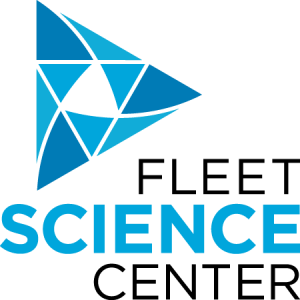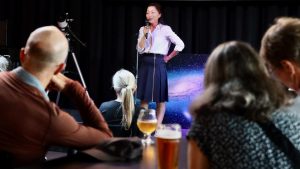News featuring UC San Diego MRSEC and its Investigators
Submission deadline: November 22, 2021 (11:59 pm PDT) via ucsd.infoready4.com
We are pleased to announce a call for proposals for the 2021-2022 UC San MRSEC Seed Grant Program. The program is open to all faculty members within the UC San Diego materials research community. The annual program is intended to provide short-term funding to initiate exciting collaborations within one of the two UC San Diego MRSEC thematic areas – the Interdisciplinary Research Groups (IRGs). The goal of the Seed Grant Program is to support collaborative research that is innovative and offers a potential for developing new IRG directions.
IRG1 focuses on synthetic and computational aspects of the mesoscale assembly of materials. IRG2 seeks to develop stimuli-responsive ‘living materials’ by merging polymer science with synthetic biology.
Each Seed Grant will provide $25,000-$75,000 direct costs for a one-year project, with the potential for renewal for a second year or for continuous IRG support, subject to review. For more information on eligibility, review criteria and proposal submission, click here.
For 2020-2021 Seed Project Faculty & Collaborators, click here.
April 8, 2021 | Source: Materials Research Society
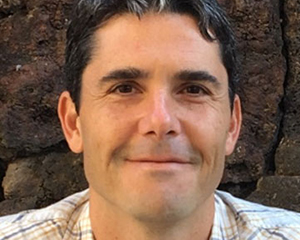
Dr. Akif Tezcan, Professor at the Chemistry & Biochemistry Department at UC San Diego, and UC San Diego MRSEC IRG1-Affiliated Faculty has been awarded the 2021 Guggenheim Fellowship. Appointed on the basis of prior achievement and exceptional promise, the successful candidates were chosen from a group of almost 3,000 applicants. Created in 1925 by Senator Simon and Olga Guggenheim in memory of their son John Simon Guggenheim, the Foundation has offered fellowships to exceptional individuals in pursuit of scholarship in any field of knowledge and creation in any art form, under the freest possible conditions.
Read the full story here.
March 31, 2021 | Source: Materials Research Society

Dr. Shirley Meng, Professor at the Department of Nanoengineering at UC San Diego, Director of the Institute for Materials Discovery and Design (IMDD), and UC San Diego MRSEC's Facilities/External Relations Lead has been selected to the Class of 2021 MRS Fellows. The title of MRS Fellow honors those MRS members who are notable for their distinguished research accomplishments and their outstanding contributions to the advancement of materials research, world-wide. The maximum number of new Fellow appointments each year is limited up to 0.2% of the current MRS regular membership and to those with continuous engagement with MRS. Thus, the distinction is highly selective. Congratulations, Professor Meng!
For additional information, visit https://www.mrs.org/careers-advancement/awards/spring-awards/mrs-fellows/list-of-mrs-fellows
March 9, 2021 | Source: UC San Diego Jacobs School of Engineering

Professor at the Department of Nanoengineering at UC San Diego, and the UC San Diego MRSEC IRG2 Co-Lead, Dr. Nicole Steinmetz, was honored to become a Fellow of the International Association of Advanced Materials in recognition of her contribution to "Advancement of Materials to Global Excellence". Congratulations, Professor Steinmetz!
Professor Alex Frañó named a 2021 Cottrell Scholar
February 9, 2021 | Source: Research Corporation for Science Advancement
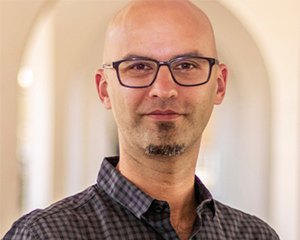 Research Corporation for Science Advancement has named 25 outstanding teacher-scholars in chemistry, physics, and astronomy as recipients of its 2021 Cottrell Scholar Awards. Alex Frañó, Professor at the Department of Physics at the University of California San Diego, and a MRSEC-affiliated faculty was among this year's recipients.
Research Corporation for Science Advancement has named 25 outstanding teacher-scholars in chemistry, physics, and astronomy as recipients of its 2021 Cottrell Scholar Awards. Alex Frañó, Professor at the Department of Physics at the University of California San Diego, and a MRSEC-affiliated faculty was among this year's recipients.
Recipients are chosen through a rigorous peer-review process of applications from top research universities, degree-granting research institutes, and primarily undergraduate institutions in the United States and Canada. Their award proposals incorporate both science education and research. Each award is $100,000. Congratulations, Professor Frañó!
Read the full story here.
Congratulations to the MRSEC 2020 Seed Grant Recipients!
February 4, 2021 | Source: UC San Diego MRSEC
The MRSEC 2020 Seed Grant Recipients are:
IRG1:
Alina Schimpf, Assistant Professor, Chemistry & Biochemistry. Proposal Title: Precise Synthesis of Nanocrystal Building-Blocks
Zheng Chen, Assistant Professor, Nanoengineering. Proposal Title: Hierarchical Assembly of Structurally Oriented Metal-Organic Frameworks as Novel Ionic Conductors
IRG2:
Donald Sirbuly, Associate Professor, Nanoengineering. Proposal Title: Nanofiber optics for in situ real-time nanometrology
October 30, 2020 | Source: UC San Diego Jacobs School of Engineering
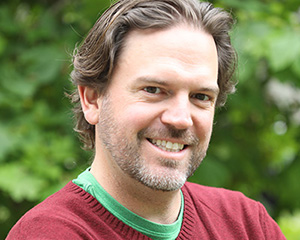 The U.S. Department of Energy (DOE) has announced more than $27 million in funding for 12 projects that will support the development of advanced renewable plastics and new recyclable-by-design plastics. Two of the dozen projects—collectively funded for more than $4 million—belong to UC San Diego researchers: Professor of Chemistry and Biochemistry, and Director of the Center for Renewable Materials, Michael Burkart and Professor of Nanoengineering Jon Pokorski (pictured right), both part of the university’s Institute for Materials Discovery and Design.
The U.S. Department of Energy (DOE) has announced more than $27 million in funding for 12 projects that will support the development of advanced renewable plastics and new recyclable-by-design plastics. Two of the dozen projects—collectively funded for more than $4 million—belong to UC San Diego researchers: Professor of Chemistry and Biochemistry, and Director of the Center for Renewable Materials, Michael Burkart and Professor of Nanoengineering Jon Pokorski (pictured right), both part of the university’s Institute for Materials Discovery and Design.
Part of DOE’s Plastics Innovation Challenge, these projects will help improve existing recycling processes that break plastics into chemical building blocks, which can in turn be used to make new products. For example, Burkart, Skip Pomeroy (chemistry and biochemistry) and Stephen Mayfield (biology) have developed algae-based polyurethane foams used in commercial products like surfboards and flip-flops that are partially biodegradable. The new $2 million from the DOE toward their project will further their goal of achieving full renewability.
Read the full story here.
September 8, 2020 | Source: UC San Diego MRSEC
UC San Diego MRSEC is announcing a call for proposals for its 2020 Seed Grant program. This program aims to initiate collaborations complementary to the two MRSEC Interdisciplinary Research Groups (IRGs): IRG 1: synthetic and computational aspects of the mesoscale assembly of materials; IRG2: stimuli-responsive ‘living materials’ by merging polymer science with synthetic biology.
Each Seed Grant will provide $25K-$75K, for a one-year project and must include one faculty-member PI, in addition to two or more faculty collaborators currently within the MRSEC. 2-3 awards are anticipated. Eligible applicants are ladder-rank UC San Diego Faculty members not currently within a UC San Diego MRSEC IRG. Proposals must be submitted through ucsd.infoready4.com by November 13, 2020, 11:59PM Pacific Time
August 13, 2020 | Source: UC San Diego News
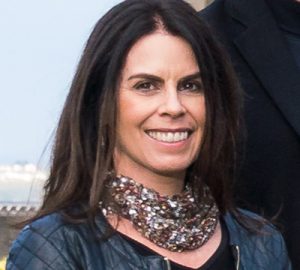
Women in the Department of Chemistry and Biochemistry are taking bold steps toward increased balance and fairness on campus. For example, Department Chair and Distinguished Professor Vicki Grassian set the pace by establishing the role of Vice Chair of Equity, Diversity, Inclusion and Climate (VC-EDIC). Professor Stacey Brydges—a long-time leader in chemistry education and ardent champion of social justice and access to/retention in STEM—quickened the pace when she became the inaugural vice chair.
Grassian is a leader who works collaboratively to effect change. She previously served as executive associate dean for the Division of Physical Sciences and led the Task Force on the Status of Women in the Physical Sciences along with Associate Dean of EDI Alison Coil. Brydges, who was part of that task force—along with other scientists in the division—said that the processes and products used by the task force offer a great template from which to work.
Full article here.
JULY 16, 2020 | Source: Energy.gov
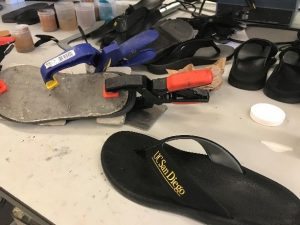
A flip flop prototype made by Algenesis in their UCSD laboratory. Photo credit: Daniel Fishman
Foams are a ubiquitous consumer product, supporting people in many different ways – think yoga mats, seat cushions, mattresses, insulation, footwear, and more. These diverse products all have one thing in common: they’re made from polyurethane. Most polyurethanes are made from petroleum, but in recent years foam makers have tried to incorporate renewable building blocks made from plants and algae. Until now, creating foams entirely from plants and algae was impractical, but researchers at Algenesis in La Jolla, California, are making exciting progress towards changing that!
When the Advanced Algal Systems team at the Bioenergy Technologies Office (BETO), led by technical manager Daniel Fishman, last caught up with this group of researchers based at the University of California, San Diego (UC San Diego), including this blog’s co-author Professor Michael Burkart (IRG 2), they were making waves (literally!) with the world’s first algae-based surfboard. While that breakthrough generated interest globally, the BETO and UCSD project partners knew there was more work to be done, because the foam that went into the surfboard, and a range of other products like flip-flops, was only half algae. The other half of the foam recipe still called for a petroleum-based family of chemicals known as isocyanates.
Full article here.
$18M Boost to Materials Science Research at UC San Diego
Students and faculty will shape the nano- and bio-materials that will make life better, healthier and safer
JULY 9, 2020 | Source: UC San Diego News
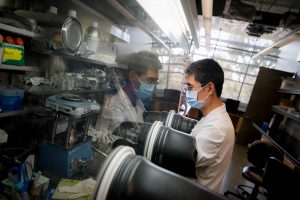
The UC San Diego MRSEC center provides sustained research and educational opportunities for both graduate and undergraduate students, with a particular focus on transfer students. Photos by Erik Jepsen/University Communications
The National Science Foundation has awarded University of California San Diego researchers a six-year $18 million grant to fund a new Materials Research Science and Engineering Center (MRSEC).
These research centers are transformative for the schools that earn them, putting their materials science research efforts into the global spotlight. In addition to research and facilities funding, MRSEC centers provide sustained research opportunities for both graduate and undergraduate students, and resources to focus on diversifying the pool of students studying materials science.
The UC San Diego labs funded by this new MRSEC will focus on two important, emerging approaches to build new materials aimed at improving human lives. The first research theme is all about developing new ways to control the properties of materials during their synthesis by controlling how they transition, from the smallest atomic building blocks to materials that are large enough to see with the human eye. The second research theme is focused on creating hybrid materials that incorporate living substances—microbes and plant cells—in order to create materials with new properties.
The new materials developed at UC San Diego will be used to improve the speed and accuracy of medical diagnostic tests, enable more effective therapeutics for disease treatment, quickly and efficiently decontaminate chemical or biological hazards, improve batteries, and reduce the cost of key industrial processes.
Full article here.
Community Events
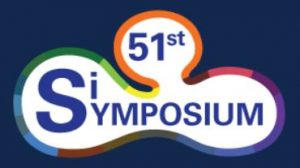
Since 1967, the North American Silicon Symposium (originally the Organosilicon Symposium) has brought together individuals in from industry and academia to celebrate innovation in silicon chemistry and the recipient of the Frederic Stanley Kipping award. The 2020 awardee is Dr. Barry Arkles, founder, president, and chief technology officer of Gelest Corp. The Institute for Materials Discovery & Design at the University of California, San Diego is pleased to host the 51st Annual Silicon Symposium at the new venue, Park & Market in Downtown San Diego.
Oct. 11, 2021 | Source: Fleet Science Center
October 11, 6:30 to 8:00 p.m
Topic: Nanotechnology in our World
What do the waterproof fabric Gore-tex and the latest coronavirus vaccines have in common? They are both made using nanotechnology. An increasing number of the products we encounter in our daily lives contain nanometer-scale objects that enable their function, and even many “conventional” products are now made using nanotechnology. What is it about a nanomaterial that makes it different? Providing examples from the fields of medicine, consumer products, and environmental safety, Prof. Sailor will discuss the promises, the challenges, and the dangers of the emerging field of nanotechnology.
Location: Thorn Street Brewery North Park, 3176 Thorn St, San Diego, CA 92104
We thank Thorn for opening their doors for us again! Thorn Beer will be available for purchase and food will be available from a local food truck!
September 25, 2021 (Saturday) 8:45 am - 11:50 am PDT
September 26, 2021 (Sunday) 9:00 am - 11 am PDT
"How to Optimize our Knowledge Management Strategies to Ensure Streamlining and Sustainability of K-12 Nanotechnology Education"
Location: Virtual Event via Zoom Meeting
Sept. 13, 2021 | Source: Fleet Science Center
September 13, 6 to 7:30 p.m. Please note different time!
Topic: Human and Machine Intelligence in Nanoengineering
Recent advances in computing power and computer vision have facilitated a new way of thinking about designing nanomaterials for energy, human health and climate resilience applications. What does the future hold? And, what are the prospects for these new approaches in addressing some of our biggest challenges? Tod Pascal will take us through a brief journey on using computer simulations to advance material science, highlighting successes, challenges and a lot of surprises at the UC San Diego Materials Research Science and Engineering Center, specifically in the Predictive assembly thrust.
Location: Waterfront Grill at Pier 32 Marina, 3201 Marina Way, National City, CA 91950
We thank the Waterfront Grill for welcoming us for the first time to National City! Waterfront Grill offers delicious food as well as full bar. We encourage you to come early to order food and drinks before the event starts. PLEASE NOTE: This is an outdoor venue. Please plan accordingly. Heaters will be available.
August 9, 2021 | Source: Fleet Science Center
August 9, 6:30 to 8 p.m.
Topic: The Race for Better Batteries
Conversion of raw materials into usable energy and storage of the energy produced are common aspects of everyday life. The development of better batteries is a key technological challenge of the 21st century. Advances will allow smaller more powerful batteries and will provide a greater ability to harness more sustainable energy sources and improve our quality of life. Prof. Shirley Meng leads the Laboratory for Energy Storage and Conversion (LESC), at the University of California San Diego to design and develop new functional nano-materials and nano-structures for energy storage and conversion. Learn more how her lab’s research has made batteries safer, more powerful and last longer.
Location: Wavelength Brewing, 236 Main Street, Vista, CA 92084
We thank Wavelength Brewing for welcoming us back into their space after a year of virtual Suds & Science events. Wavelength beers will be available for purchase and we encourage you to bring your own dinner!
July 12, 2021 | Source: Fleet Science Center
Monday, July 12, 6:30pm - 8:00pm
Making Medicine More Equitable through Materials Science
The global pandemic has highlighted the vast disparities in access to life-saving drugs and vaccines between rich and poor communities and nations. Dr. Pokorski is trying to use lessons learned in the manufacturing of Legos to make access to medicine more equitable throughout the world. By using tools from plastics manufacturing, his research provides the opportunity to administer treatments at home that are painless, eliminate the need for multiple doses of a vaccine, and allows for pharmaceutical products to be shipped throughout the world without need for refrigeration. Learn more about how Dr. Pokorski is using common manufacturing tools to make new vaccines for HPV, cholesterol, and even COVID-19.
Presenter: Jonathan Pokorski, Associate Professor, Nanoengineering, UC San Diego
Location: We are back to in-person events! And we thank Thorn Brewing for hosting our first in-person event in over a year!
Thorn Brewing, 3176 Thorn Street, San Diego, CA 92104
Thorn Beers available for purchase. Bring your own dinner to enjoy!
May 17, 2021 | Source: Fleet Science Center
Monday, June 14, 6:30pm - 8:00pm
Topic: What are Nano Materials and why Should we Care?
Presenter: Andrea Tao, Associate Professor, Nanoengineering, UC San Diego
Location: via Zoom
Additional information coming soon
March 4, 2021 | Source: Fleet Science Center
March 8, 7:00 p.m. to 8:30 p.m.
Topic: From Black-Eyed Peas to Cancer Nanotechnology
We are living in a global pandemic and all of us are thinking about viruses. Pandemic or not, Dr. Steinmetz has viruses on her mind all the time… specifically plant viruses. To her, plant viruses are not pathogens or infectious agents – rather, Dr. Steinmetz sees plant viruses as ‘nanoscale’ tools that can be repurposed for applications targeting human health. While plant viruses can interact with cells in the human body, they cannot infect humans and the research in Dr. Steinmetz Lab sets out to engineer plant viruses to fight cancer, cardiovascular disease, and lately also COVID-19. Learn more about how her lab’s research has successfully treated cancer in dogs, and what that might mean for humans.
Location: Virtual through Zoom
To register, visit the Fleet Science Center website.

